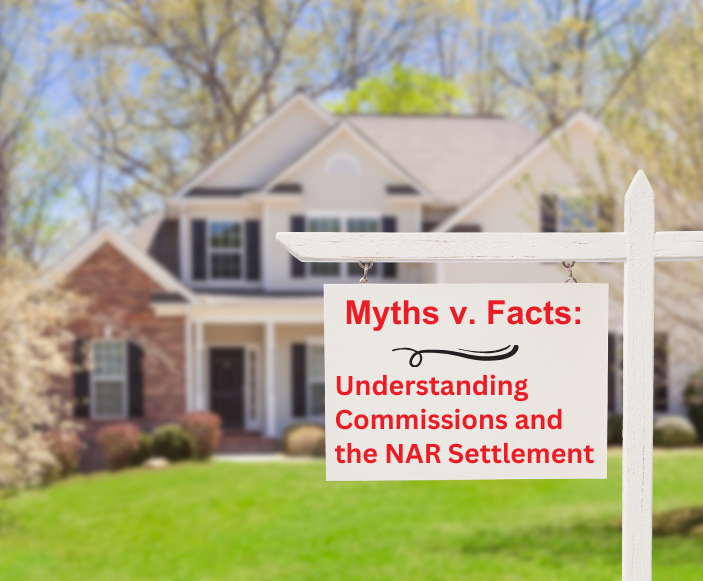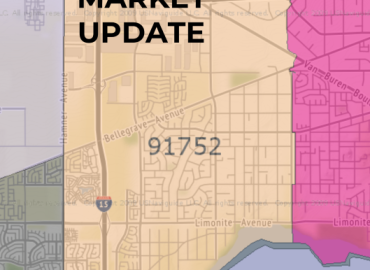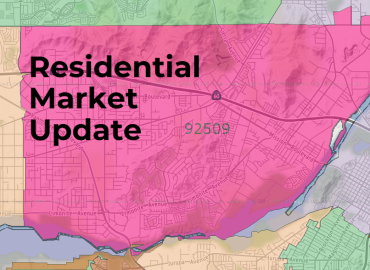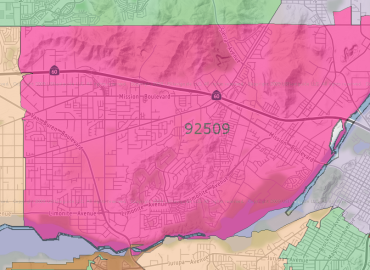Myths v. Facts: Understanding Commissions and the National Association of Realtors (NAR) Settlement
“6% Real Estate Commissions are Dead.”
“Home Prices Will Be Dropping”
“Real Estate Agents are History.”
– Unfortunately, a lot of inaccurate information is circulating in public. The media prefers dramatic headlines instead of explaining the real story about the landmark National Association of Realtors (NAR) lawsuit settlement that surfaced on Friday, March 15, 2024.
So let me give you some straight answers. I’ve read the 108-page NAR proposed settlement. It’s not an exciting read, but no legal document is.
Although the settlement will likely be tweaked before it is finalized, two main points will have a major effect on how the real estate industry operates.
One important thing to remember is that this is a proposed settlement, which means that it still must be approved by the trial Judge.
UPDATES:
On April 24, 2024, the court granted preliminary approval of the settlement.
The practice changes set forth in the settlement agreement will take effect August 17, 2024.
The settlement is subject to final court approval. The final approval hearing is scheduled to take place on November 26, 2024.
The Genesis of Change: A New Rule About Offers of Compensation
The heart of the NAR settlement is the introduction of a new rule prohibiting the communication of unilateral compensation offers through the Multiple Listing Service (MLS).
What on earth does that mean? It means that the MLS will no longer be able to advertise compensation offers to buyer’s brokers for listed homes.
Before this settlement, when a home seller wanted to sell their home, they signed a listing contract with the selling broker to sell the house. The selling Broker’s negotiated compensation to sell the home was part of the listing contract. Once listed, the selling Broker would advertise the home for sale in the MLS and specify a specific compensation amount to be paid to a buyer’s broker who brought an offer that the seller accepted upon the successful closing of escrow. The compensation paid to the buyer’s broker was paid by the selling Broker from the sales fees charged to the seller in the listing contract.
In other words, the Broker representing the seller cooperated with the buyer’s broker and paid the buyer’s broker a specified fee for bringing the offer, upon closing the escrow. That fee was paid from the selling Broker’s compensation due at the close of escrow.
Under the proposed rule, which is likely coming mid-July 2024, a selling Broker will no longer be able to advertise a compensation amount to be paid to a cooperating buyer’s broker in the MLS.
This change, in essence, “decouples” or “separates” the fees paid to a selling Broker from those paid to a buyer’s broker.
In the past, some real estate agents allegedly failed to disclose to sellers how the fee charged for selling the home was to be used. Thus, some sellers didn’t understand the real estate sales process, which is how these lawsuits got started.
This change underscores a move towards more direct consultation and negotiation between a seller and a real estate broker – off the MLS.
Despite this shift away from the MLS for compensation offers, the NAR settlement ensures that cooperative compensation remains an option. This means that a home seller is still able to offer compensation to a buyer’s broker that brings the accepted offer, it just can’t be promoted on the MLS.
A Leap Towards Transparency: The New Rule About Written Agreements and Buyers
Another cornerstone of the NAR settlement is the requirement that MLS participants (agents) working with buyers enter into a written agreement with a buyer before showing a home. This measure is designed to enhance transparency, ensuring that consumers clearly understand the services and value provided and the associated costs.
The NAR settlement aims to fortify consumer confidence and comprehension of the real estate process by requiring written agreements with agents from the beginning of the buyer-agent relationship.
In the past, many real estate agents showed buyers homes without a written agreement. Often, some agents allegedly failed to disclose to their buyer client that the seller was paying them, nor the amount of money the agent would get at the close of escrow and who was paying that money. The buyer agent’s #1 goal was to close that transaction to get paid, perhaps at the expense of the buyer’s interests. The concept of fiduciary duty was lost, which lead to these types of lawsuits.
In addition, some selling agents who listed the seller’s property would also represent the buyer and ‘double end’ the sale as a dual agent. They allegedly failed to disclose to the buyer and/or the seller the amount of money they would get upon closing the escrow. Regardless of any failure to disclose, a ‘dual agency’ transaction conflicts with an agent’s fiduciary duty owed to the seller and, as a dual agent, also owed to the buyer.
To be clear, in a dual agency transaction the seller, the buyer, and the agent all have competing interests, so it would be a farce to suggest that a single agent representing both sides is adhering to his/her fiduciary duty that is owed to the seller, and to the buyer, which is the “expectation to provide loyalty, confidentiality, obedience, accountability, and to use their skills and expertise to the advantage of their client.”
As of now, California allows for dual agency in real estate transactions so long as all parties agree to it. The problem is that most sellers and buyers, although they sign a document acknowledging the dual agency arrangement, do not understand the concept of dual agency and its ramifications. Moreover, the agent is not qualified to fully explain the conflicts in a dual-agency transaction. So sellers and buyers sign a form because the agent essentially instructs them to do so. The buyer and seller want to move forward with the transaction, so they generally go along with the arrangement. Contract law teaches us that there is never a problem until there’s a problem.
Personally, I believe that dual agency, where one agent represents both the seller and the buyer in the same transaction will eventually be abolished in California, as many other states have already done.
Don’t Believe the Myths: Let’s Debunk the False Information
Now let’s clear up some of the major myths that the media has been promoting about the effects of the NAR settlement. Here are the top four myths:
Myth 1. The NAR settlement forces real estate brokers to reduce their compensation. False.
No, agents are not being forced to charge less. Like before the settlement, real estate agent fees are negotiable. Sellers and agents have always had the right to discuss and agree on a price. Brokers are their own bosses, and they compete with each other to offer services at different prices and quality levels.
Myth 2. The NAR settlement will prohibit sellers from paying a commission to a buyer’s agent. False.
A seller can still choose to pay the buyer’s agent. It’s completely up to the seller to decide if they want to pay a commission to the agent who brings the buyer. This can actually help sell your house because it gives the buyer’s agents a good reason to show and sell your home.
Myth 3. The NAR settlement will now relieve sellers of any financial burden of buyer agent fees. False.
Sellers aren’t necessarily off the hook for buyer agent fees. Even if a seller decides not to offer the buyer’s agent a fee in the listing contract, the buyer may ask the seller to cover their agent’s fee as part of their offer or ask for help with other costs like closing expenses, etc., as a concession.
Myth 4. The NAR settlement will lower real estate prices and make homeownership affordable again. False.
Don’t expect house prices to drop because of this NAR settlement. The real estate market is driven by supply and demand. What a house costs depends on how many people want to buy and how many houses are available, not on agent fees. Even if agent fees were lower, it wouldn’t make a huge difference in affordability. House prices have gone up a lot over the years because buyer demand has been greater than the supply of homes for sale, and that’s the real reason buying a home has become more expensive.
Looking Ahead
As part of the settlement, the National Association of Realtors (NAR) introduced these new rules to make the process of buying and selling houses more transparent for everyone involved. These new guidelines are big on honesty; they give buyers and sellers more say in the process and make the home selling/buying process more transparent.
As we approach the implementation date of these new rules (mid-July 2024), real estate professionals and consumers alike must educate themselves about these changes to successfully navigate the evolving real estate landscape and the opportunity it brings.
Ultimately, these changes will bring a more informed, transparent, and consumer-centric real estate market, where everything is out in the open and everyone gets a fair shake.
If you have any questions about the NAR settlement, please get in touch with me directly. My contact information is below.
Manny Barba
Broker-Attorney-Realtor®
951-990-3998
MB Live Realty, Inc.











No Comments